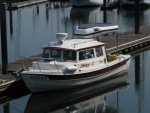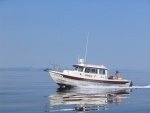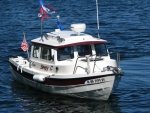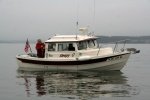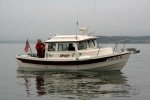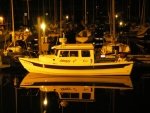AstoriaDave
New member
- Joined
- Oct 31, 2005
- Messages
- 994
- Reaction score
- 0
Jason,
You got the horse laugh when you asked around about boater ed classes because really good instruction beyond whatever your state requires (or advises) for new boaters is very rare, and expensive when you do find it. In Oregon, new boaters are required to pass a class, now just a day long seminar, before earning a "boater ed" card. This was phased in over a period of years, moving up the age brackets. It has very heavy emphasis on novice boaters, especially PWC operators, because that is the demographic group where the greatest incidence of water-related casualties is.
You might find an "advanced" USCG or Power Squadron boating class, whose content is what was required in the old boater ed class. I took that, back in 2007, from the local Power Squadron, and it was excellent! YMMV, however, because the local group brought in USCG experts, etc., and had instruction on avoiding and dealing with hazards unique to our area [Columbia River Bar and estuary, as well as near shore sport fishery]. Others, who took similar classes where the major boating activity is running a wakeboard boat on the local lake, got none of that added instruction. None. Yet, they carry the same boater ed card I do.
All of this is by way of explaining why the best way to get started on training yourself on running tricky bars and inlets is ... hitching a ride with a local who runs them regularly. It will be worth the money to pay someone with a solid reputation if you can do a ridealong. Ask around.
You got the horse laugh when you asked around about boater ed classes because really good instruction beyond whatever your state requires (or advises) for new boaters is very rare, and expensive when you do find it. In Oregon, new boaters are required to pass a class, now just a day long seminar, before earning a "boater ed" card. This was phased in over a period of years, moving up the age brackets. It has very heavy emphasis on novice boaters, especially PWC operators, because that is the demographic group where the greatest incidence of water-related casualties is.
You might find an "advanced" USCG or Power Squadron boating class, whose content is what was required in the old boater ed class. I took that, back in 2007, from the local Power Squadron, and it was excellent! YMMV, however, because the local group brought in USCG experts, etc., and had instruction on avoiding and dealing with hazards unique to our area [Columbia River Bar and estuary, as well as near shore sport fishery]. Others, who took similar classes where the major boating activity is running a wakeboard boat on the local lake, got none of that added instruction. None. Yet, they carry the same boater ed card I do.
All of this is by way of explaining why the best way to get started on training yourself on running tricky bars and inlets is ... hitching a ride with a local who runs them regularly. It will be worth the money to pay someone with a solid reputation if you can do a ridealong. Ask around.

